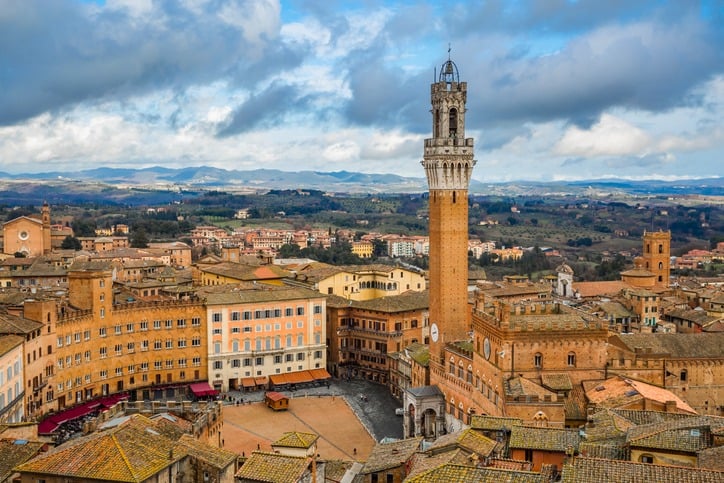Recently the City Council of Siena, Italy has taken a stand against antisemitism. Last Friday, thanks to the efforts of our Diplomatic Corps Member David Fiorentini, together with the Italian Union of Jewish Students – UGEI and the party Forza Italia, the IHRA working definition of antisemitism has been fully adopted. An important step towards a coherent and structured fight against the growing virus of antisemitism. We congratulate David and his partners for this excellent effort to help safeguard Jewish life in Europe.
Additional Articles
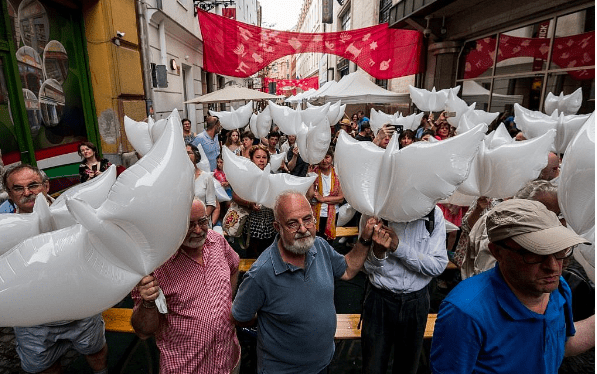
Thousands in Budapest flock to Jewish street fair in sign of community’s revival
In scene uniting Jews of all denominations, some 10,000 brave thunderstorm to throng Hungarian capital’s touristic Kazinczy street for annual Judafest
BUDAPEST – Thousands flocked to Budapest’s Kazinczy street in the heart of the historic Jewish ghetto on Sunday to celebrate the city’s Judafest.
Braving an afternoon downpour, tourists and locals alike visited the massive street festival, which annually showcases all things Hungarian and Jewish. It’s quite a coup for a central European Jewish community still recovering from World War II and decades of Communism.
The thoroughfare, a common tourist destination throughout the year, teemed with both Jewish and non-Jewish onlookers who stopped at the dozens of stalls offering traditional Jewish foods, handmade items for sale, and information on the multitude of religious and community initiatives that operate in Hungary and the surrounding areas.
Parents pushed baby carriages and walked hand-in-hand with children who sported brightly colored face paint and clutched balloons decorated with the logos of Jewish organizations.
“I think we have even more people than last year,” festival organizer Pepe Berenyi told The Times of Israel. Berenyi, who is also the deputy director of Budapest’s Balint House JCC, estimated that 9,000 to 10,000 people had passed through the festival by mid-afternoon.
Judafest perennially brings together congregations and organizations from all walks of Hungarian Jewish life and across secular and all religious denominations — no mean feat for any Jewish community. The festival was organized by Budapest’s Balint House JCC and the American Jewish Joint Distribution Committee, and featured over 30 partners from across the community.
This year also saw significant representation from the country’s periphery and Israel, including the towns of Koszeg, on the Austrian border, and Komarom, on the border with Slovakia – in keeping with the festival’s theme of “Hungarian-speaking Jewish communities.”
A secular humanitarian organization set up shop across from Chabad Hasidic emissaries who gave passersby the chance to say a short prayer with a set of phylacteries. Representatives from many of the city’s various synagogues lounged together amid the many food stands offering tastes of traditional Jewish fare ranging from cholent to freshly baked challah to plates of Israeli hummus.
In the late afternoon, the sunshine gave way to heavy gray storm clouds when a not-completely-unexpected thunderstorm struck. But revelers stuck it out, huddling with umbrellas for half an hour in stone alcoves along the alleyway. As the rain finally started to let up, a handful of teenagers with matted hair took back to the street and danced in their wet clothing to Israeli music that continued to play from a nearby stall.
“Well, it was a great six hours,” joked a resilient Berenyi, who worked for months to put the festival together.
But despite some setbacks – the amplification system and other electronics were taken out of commission by the storm – visitors did not seem deterred. Stall owners bailed out water, dried off their merchandise, and went back to serving the many attendees who stuck around.
A planned concert went forward as an acoustic performance, and the three singers made up for the lack of a sound system by asking the audience to accompany them, turning the show into a sing-along.
At 19:48 Israeli time, to correspond with the year Israel was established, 70 community dignitaries released dove-shaped balloons in honor of Israel’s 70th year of independence.
Onstage, Balint House JCC director Zsuzsa Fritz sang “Lech L’cha,” by singer Debbie Friedman, citing the song’s significance.
“The song is taken from the biblical passage where God first commands Abraham to go to Israel, and promises to bless his offspring and make them into a great nation,” Fritz later told The Times of Israel. “I really felt that this was especially appropriate here as we continue to grow our community.”
Fritz said that the event was an incredibly effective outreach tool, and could encourage many people to engage with Budapest’s Jewish communal life who otherwise wouldn’t take the initiative.
Berenyi said that in Judafest’s inaugural year, Hungarians were hesitant about street festivals of any type – let alone obviously Jewish ones. In all, there were seven partners that first year, and, unexpectedly, the daylong festival was a huge success, drawing 2,500 people.
But in recent years, Judafest has grown considerably, attracting dozens of partners and drawing 12,000 attendees.
Fritz cited an impact study that the Balint House JCC conducted at the event, with pollsters asking attendees questions related to their levels of Jewish participation.
“I was walking by and overheard one of our surveyors speaking to a woman of about 60,” Fritz told The Times of Israel.
“She asked the woman if this was the sole Jewish event that she attended this year, and to my surprise, the woman answered yes,” Fritz said.
“I was sure that she looked like she participated more regularly – in this business you get a feel for these things – but this just shows that events such as this are of the utmost importance and can bring people into the fold who otherwise would feel insecure.”
The article was published on The Times of Israel
- June 13, 2018
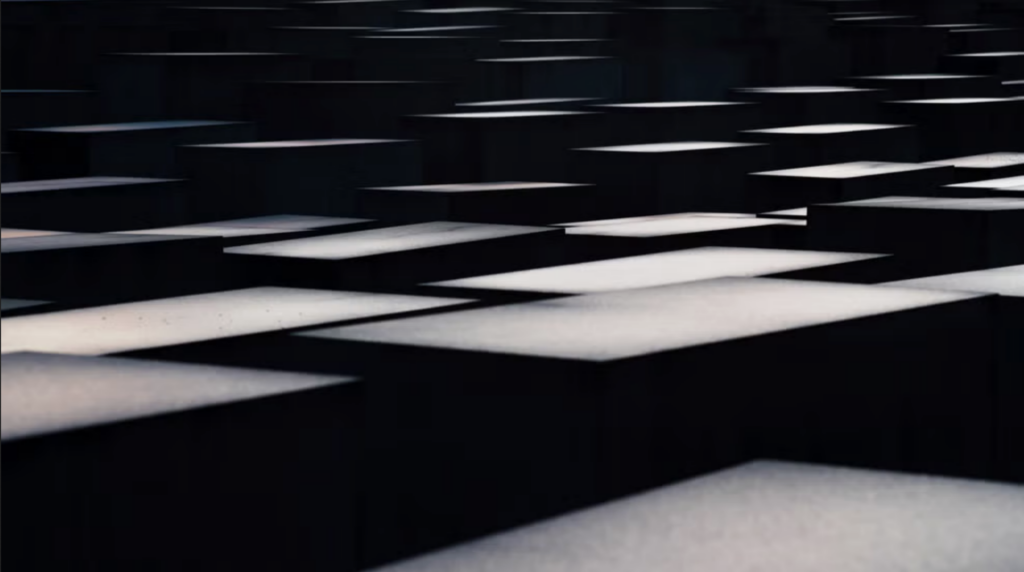
Remembering the horrors of Auschwitz, German chancellor warns of antisemitism, threats to democracy
The Independent: https://www.independent.co.uk/news/world/europe/olaf-scholz-ap-germans-jews-auschwitz-b2485902.html
Chancellor Olaf Scholz on Saturday called on all citizens to defend Germany’s democracy and fight antisemitism as the country marked the 79th anniversary of the liberation of the Nazi death camp Auschwitz-Birkenau during World War II.
Since 1996, Germany has also marked January 27 as a day to remember the horrors of the Holocaust.
“’Never again’ is every day,” Scholz said in his weekly video podcast. “January 27 calls out to us: Stay visible! Stay audible! Against antisemitism, against racism, against misanthropy — and for our democracy.”
On that day in 1945, Soviet Red Army troops liberated some 7,000 prisoners at Auschwitz in German-occupied Poland. The Nazis murdered more than a million people in Auschwitz, most of them Jews.
In the days before the liberation, the Germans had evacuated tens of thousands of other inmates on foot in what is now called the Death March, because many inmates died of exhaustion and cold in the sub-freezing temperatures.
Altogether, they killed six million European Jews during the Holocaust.
On Saturday, as people in Germany put down flowers and lit candles at memorials for the victims of the Nazi terror, the German chancellor said that his country would continue to carry the responsibility for this “crime against humanity.”
He stressed that the fight against any kind of antisemitism and for democracy is not something that can be done by the government only, but needs the support of all Germans.
“Never again” demands the vigilance of everyone,” Scholz said. “Our democracy is not God-given. It is man-made.”
“It is strong when we support it,’ he added. ”And it needs us when it is under attack.”
Scholz referred specifically to the threat posed by the rise of far-right populists in Germany, elsewhere across Europe and worldwide “who are stirring up fears and sowing hatred.”
At the same time, the chancellor praised the millions of Germans who have joined pro-democracy protests in recent weeks.
“Our country is on its feet right now. Millions of citizens are taking to the streets: For democracy, for respect and humanity,” he said, adding that it was their solidarity “that makes our democracy strong. Showing it confidently in public — as is happening now — is a good thing.”
A report that right-wing extremists recently met to discuss the deportation of millions of immigrants, including some with German citizenship triggered massive demonstrations across the country. Some members of the far-right Alternative for Germany party, or AfD, were present at the meeting.
Growing anxiety over the AfD’s rising support among the German electorate also catalyzed pro-democracy protesters.
The AfD was founded as a eurosceptic party in 2013 and first entered the German Bundestag in 2017. Polling now puts it in second place nationally with around 23%, far above the 10.3% it won during the last federal election in 2021.
The party enjoys major support and is leading in eastern Germany, including the states of Brandenburg, Saxony and Thuringia, slated to hold elections this fall.
One of the oldest German Holocaust survivors, 102-year-old Margot Friedlaender expressed concern about the the spike in antisemitic incidents in the country.
“I would never have thought that it would happen like this again, because that’s how it started back then,” she said on public Television ARD on Friday, referring to the rise of the far-right. Friedlaender said for those of endured the horrors of the Holocaust it is “particularly difficult to understand and very sad.”
- February 16, 2024
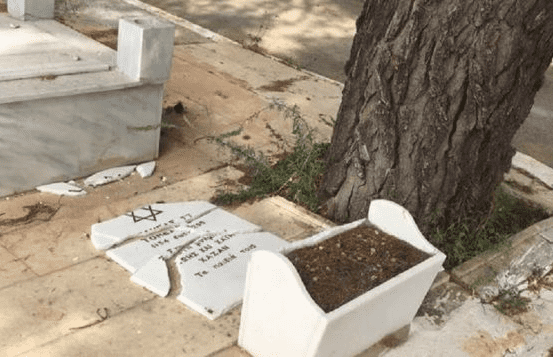
Jewish headstones smashed at Greek cemetery
Jewish Community of Athens spokesman says: “the scene is repulsive and our disappointment is great” after vandals carried out attack during early hours of Shabbat
A Jewish cemetery near Athens that was desecrated with neo-Nazi symbols two years ago has once again be vandalised.
A press release by the Jewish Community of Athens said: “On Saturday, the most holy day in Judaism, it is imperative and we are accustomed to abstain from everyday activities and, of course, from announcements. In the context of this almost absolute rigor of observance of the Sabbath holiday, there are exceptions that have to do with dealing with the threat of a life or a great pain.
“Such is the pain that caused us, today, on Saturday, May 5, 2018, the revelation of a new wave of vandalism in the Jewish Cemetery of Athens. Unknown vandals entered our Cemetery during the night and destroyed nine commemorative marble struts kicking them with fury, leaving them to peel off their bases and crushing them on the ground. These marble slabs are used to mark the sectors of our Cemetery and are dedicated to the memory of the dead by their families.
“The scene is repulsive and our disappointment is great. This is not the first time we see the result of a degrading act at our Cemetery but it is the first time we see such act was organised and planned in part of the Cemetery that is not visible from the neighboring houses and with incredible fury. The view of the results of this abominable act causes us deep sorrow and anger.
“The Jewish Community of Athens will exercise all the legal means at its disposal, the first steps have already been taken by the police authorities that immediately came to the collection of clues.
“But besides the Law, we call upon all the institutions of the State and the City, the Justice, the Religious and Spiritual Authorities of the country and the Civil Society, to condemn unambiguously and without reservation this desecration and to stand with absolutely zero tolerance against such phenomena of violence and intolerance. There is no worse sign of a society’s moral decline than desecration of a Cemetery and disrespect for the dead.
“It is not just an act that concerns only our Community and is recorded as one of the most violent and significant anti-Semitic events of recent years in Greece. It is about an act that brutally affects the whole of society, the values and principles of a favored state.
For these reason, we ask everybody to exhaust every effort to never allow such acts against anyone.”
In October 2015, parties who have not been identified wrote in black paint on the entrance to the same cemetery south of the Greek capital the number 18 – a neo-Nazi code for Adolf Hitler — and the word “raus” – German for “out.” In Nazi Germany, the phrase Juden raus, “Jews out,” was a common slogan among anti-Semites. They also painted a swastika on the cemetery’s gate.
Greece’s Golden Dawn party is widely considered one of Europe’s most virulent neo-Nazi movements with representation in a national parliament. It holds 16 seats out of 300 in the Greek parliament.
The Nikaia Jewish cemetery is an active and relatively new place of burial. The community has been burying its dead there since shortly after World War II, when city authorities allocated the land to the community for this purpose.
The article was published on the Jewish News Online
- May 7, 2018
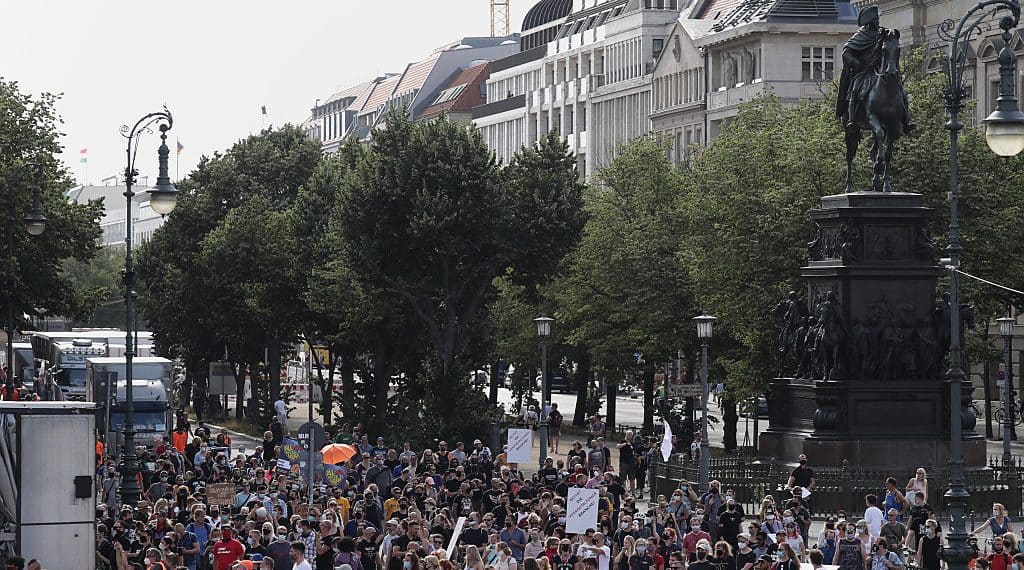
European Jews face new threat in wake of COVID-related anti-Semitism
Top European rabbi tells Israel Hayom a special center to monitor real-time incidents via remote feeds could be established in order to tackle anti-Jewish attacks.
The recent terrorist attacks in Austria and France, as well as the spike in coronavirus cases in Europe, has created a fear among Jews in the continent that anti-Semitic conspiracy theories blaming Jews for the spread of the pandemic could become mainstream.
A recent study in Germany showed that one in three Germans has somewhat of a conspiratorial view of the world.
Felix Klein, who is the federal commissioner for Jewish life in Germany and the fight against anti-Semitism, told Israel Hayom that the recent protests against the COVID-19 regulations have become fertile ground for anti-Jewish sentiment.
“The current protests against corona-related restrictions serve as a rallying point for antisemites, Holocaust deniers, and believers in conspiracy myths. At “hygiene protests”, participants downplay the Holocaust by, for example, comparing the current requirement to wear a face mask with the obligation to wear a Star of David during the Nazi regime,” he told Israel Hayom. “Portraying themselves as rebels – as do for example the supporters of the new political party Widerstand2020 (Resistance2020) and the Reichsbürger movement – is typical of adherents to anti-Semitic beliefs: Presenting oneself as breaking taboos, as ‘finally’ bringing the truth to light, as showing at last who is pulling the strings behind the scenes – and, as has been done for thousands of years, pointing their fingers once again at Jews,” he added.
When asked about the danger posed by such conspiratorial views, he noted that there is a concern verbal statements could eventually morph into action.
“Conspiracy myths also prepare the ground for violence, as history has shown. Those who perceive themselves as victims and feel threatened can themselves turn into a threat. Anti-Jewish pogroms throughout history have been the fatal consequence of such obsessive hatred of Jews, as have the antisemitic terrorist attacks worldwide in recent years,” he said. “A recent study has shown that radicalization online takes place four times faster than offline. That is what makes it so important to quickly adjust our laws. This is the thrust of the package of measures put forward by the federal government. I am confident we can achieve a lot through a combination of repression and education. After all, what is ultimately at stake is social cohesion in times of crisis.”
Meanwhile, Jewish groups have scrambled to deal with the threat of rising anti-Semitism in the age of coronavirus. The group “Concert – Together for Israel” strives to bolster Israel’s image and fight modern anti-Semitism, says its job has been made much more difficult in the wake of the pandemic, and many pro-Israel groups are facing potential elimination.
“Generally speaking, one can say that small organizations that rely on a small staff expect a slowdown and a long recovery, but the big organizations that need a large operation worry about their long-term viability in light of the added costs,” Nava Edelstein, the group’s program director says.
Rabbi Menachem Margolin, the head of the Brussels-based European Jewish Association that has led a comprehensive effort to counter anti-Semitism in Europe, told Israel Hayom that he has been overseeing a “virtual command center” that gets daily updates from Jewish communities on online anti-Jewish attacks.
“We constantly see how anti-Semitic voices on the web attribute the virus to a Zionist-Jewish conspiracy, on top over other forms of anti-Semitism that involve graffiti and vandalizing of Jewish institutions,” he said, adding the largest volume of reports originates in France, Romania and Belgium.
“We are considering setting up a center that would monitor events through Jewish communities’ video feeds in real time, so that we can alert security forces when such incidents happen,” he revealed.
- December 11, 2020

